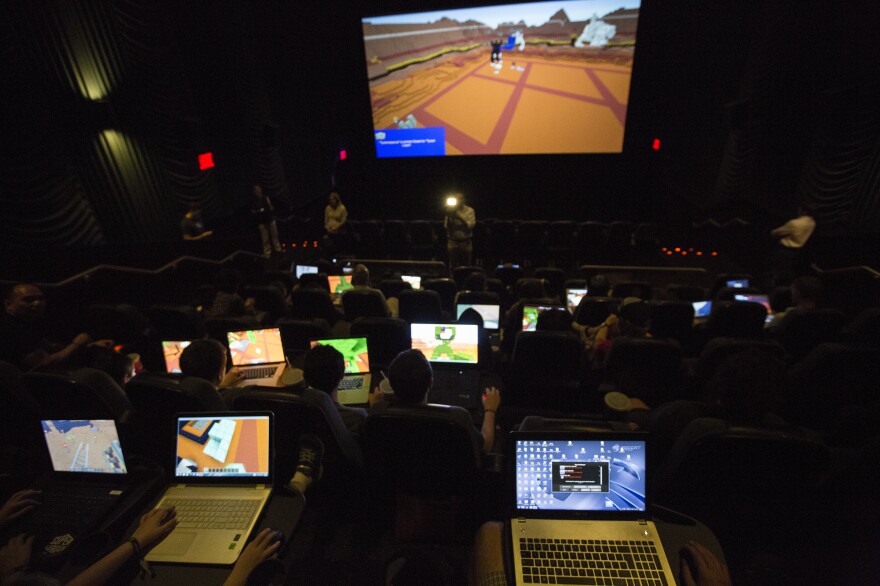Matthew Rearley plays Minecraft every day, sometimes for eight hours at a time, but he's never gamed like this before. In a movie theater full of competitors, the 15-year-old's eyes shift constantly between the computer in his lap and the 50-foot-tall screen in front of him.
"Gaming with other people, it becomes more professional," Rearley says. "The general experience of having the big screen there and sitting in a chair like this — it's a big, big game-changer."
And that's not the only way the game has changed. The tournament host, Super League Gaming, engineered an entirely new, third-person "worldview" display to project on the big screen, in addition to the traditional first-person game interface on each player's laptop. The pixelated arena image on the cinema's screen may seem low-tech, but it marks a milestone for gaming.
"For decades game developers have been trying to launch eSports or competitive gaming," says video game industry expert Scott Steinberg. "It seemed implausible as hell. But in many ways, it feels like the timing is finally starting to be right. The appetite for games is growing. Awareness is through the roof. And more and more people are coming to see video games as a social and connected experience."

About 30 players at the hour-and-a-half-long New York City event competed both in teams and solo for spots on the leaderboard, which lists the top-scoring gamers in SLG tournament history. The theater was nowhere near full at this stop on SLG's 28-city launch tour, but SLG President Brett Morris sees reason for that to change.
"There's a desire for all these kids to play with like-minded gamers," he says. "There are tens of millions of gamers across the globe and there's no reason to think that every one of them shouldn't be a member of SLG."

The four-month-old company is partnering with Regal, Cinemark, AMC and iPic to launch gaming leagues in 100 theaters in the U.S., Hong Kong and Canada this fall. Ryan Noonan, director of corporate communications for AMC, says the move is part of a larger expansion beyond traditional movie offerings. The chain now opens its doors to worship services, corporate meetings and even graduations.
"We've really enhanced what it means to go to the movies around the nation," he says. "Now we've got more potential moviegoers walking through the door. Maybe next time they're interested in seeing a movie, they'll remember what a great theater we have."
Gaming initiatives in particular will allow theaters to reclaim a critical lost customer base, according to movie theater analyst Paul Dergarabedian.
"The most coveted movie audience for years was the 18- to 24-year-old male, and now it's getting harder to get them in the movie theater because they're much more into gaming," he says. "This brings that captive audience back to the movie theater."
Still, the initiative is unlikely to be a significant revenue source for movie theaters, which Dergarabedian says are already on track for their highest earning year ever, nor a big moneymaker for game developers, according to Steinberg.

SLG does not pay to use Minecraft because it is open source, but Morris says the company is in talks with game developers to create similar "theater-mode" displays for other popular games.
Morris says expanding to other games won't increase ticket prices, but it is unclear whether many gamers will be willing to fork up $20 per event or $120 for a six-session league season.
"Gamers are increasingly expecting to pay less and less to play games," Steinberg says. "But at the same time, they're used to the festival circuit, and as long as they can create a palpable sense of enthusiasm around them, then it's entirely possible that they may be able to draw a pretty good-sized crowd."
Shana Swanson says it was well worth the price for her 6-year-old daughter Rakel's ticket to the New York City event.
"It's one thing as a parent to watch your kid game at home, but it's entirely different to come to an event like this," Swanson says. "She's connecting, laughing. I think it's a really beautiful effort, and it runs against the negative stereotype that games are keeping kids antisocial."
Despite the emphasis on social benefits, many of the gamers at the event never met their assigned teammates.
"Having them close here is cool, very social," says Rafael Demera, who attended the event with his 3-year-old daughter, who loves Minecraft. "Did I meet them physically? No, but we communicated online."
The event did serve as an opportunity to take communication offline for tweens Tyler Hines, 13, Eric Apfelbaum, 13, Jaden Bautista, 14, and Justin Bautista, 11, who connected playing Minecraft years ago. Jaden Bautista had to convince his father to take the day off work and drive him and his brother five hours round trip to the event.
"He told me he'd rather me come to this event than his eighth-grade graduation," his father Gio Bautista says. "I have to learn the value of what's important in their lives right now, and this is what's important to them."
After Skyping each other nearly every night for years, the boys agreed that meeting for the first time was awkward. But once game play started, their relationship was normalized, Hines says. Though they weren't all placed on the same team, they tried to band together in the tournament as usual.
The boys hope to see each other again soon, possibly as members of the fall league. In the meantime, they'll keep sticking together in the virtual world.
Kira Witkin is an intern with the NPR Business Desk.
Copyright 2021 NPR. To see more, visit https://www.npr.org.



